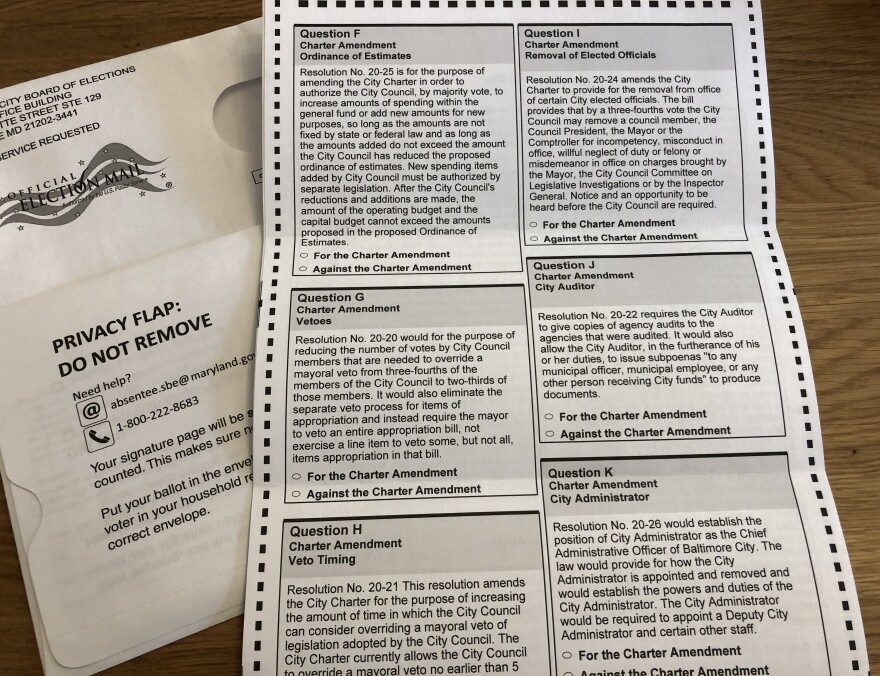In the wake of disgraced ex-mayor Catherine Pugh’s resignation, the Baltimore City Council introduced so many charter amendments intended to restructure power in City Hall that City Council President Brandon Scott created a new committee to manage them.
Many of those proposed amendments made it to the November general election ballots. City voters can find a complete ballot preview here.
Voters tend to overwhelmingly approve ballot questions; in 2016, city voters passed all 10 of Baltimore's charter amendments and bond issues.
Questions A-D
The first four Baltimore ballot questions ask voters if they’d like to authorize four different bonds to fund $160 million worth of city projects.
Question A asks voters to authorize spending about $12 million to create an Affordable Housing Program. Question B asks to spend about $38 million to build or reconstruct city schools facilities. Question C asks for another $38 million for economic development programs throughout the city. Question D asks voters to agree to spend about $72 million to develop public infrastructure, such as libraries, parks, bridges, courthouses and police stations.
More information about the general obligation bonds can be found here.
Question E
This question asks voters to approve an amendment to the city charter that would require that a Charter Revision Commission be appointed at least once every 10 years to review and make recommendations for necessary deletions, additions or revisions to the City Charter.
Baltimore City Charter dictates much of City Hall’s legislative process and city policy. The provisions range from spelling out how many people can serve on the City Council to the licensing requirements for street performers.
Changes to the City Charter may only be made by voters, so if this measurement passes, the Charter Revision Commission’s recommendations would still need to be approved by city voters.
Question F
This question asks voters whether they’d like to allow the City Council to add or shift money around the mayor’s proposed budget. As it is now, members can only vote to cut funds from the budget. For example, the council reduced the Baltimore City Police Department’s budget by $22.4 million earlier this year but were unable to reallocate that money to other city agencies or projects; only the mayor has that power under the City Charter.
Question G
This question asks voters to amend the City Charter to reduce the number of votes needed to override a mayoral veto from three-fourths of the city council members to two-thirds.
Due to a ballot drafting error from the Baltimore City Board of Elections, this question contains outdated language that is not actually part of the proposed amendment. Voters will receive a notice with the correct language, along with their ballot.
Question H
This question asks voters to amend City Charter to allow the council more time to consider overriding a mayoral veto, should its members not have a regularly scheduled meeting during the veto window. Councilman Ryan Dorsey, who introduced this bill, referred to it as “inside baseball.”
Question I
This question asks voters to amend the City Charter to allow the City Council remove the mayor, the comptroller, the City Council President or a council member for incompetency, misconduct in office, willful neglect of duty or felony or misdemeanor in office.
The amendment also would require a three-fourths council vote to remove the officials and an opportunity for the official to be heard before the City Council prior to the vote.
Question J
This question asks voters to amend the City Charter to give the city auditor subpoena power over city agencies, employees and people who do business with the city for audits.
Question K
This question asks voters to amend the City Charter to create a city administrator position to work alongside the mayor and oversee the day-to-day operations of city government. The administrator would be appointed by the mayor.
The measure was created by City Council President Brandon Scott, who said it would modernize and professionalize city government, and was passed by the council this summer. Mayor Jack Young vetoed the bill, but the council overrode the veto.






